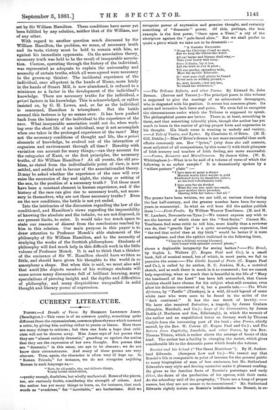CURRENT LITERATURE.
PORTRY.—A Decade of Verse. By Margaret Lawrence Jones. (Remihgton.)—This verse is of no common quality, something quite different from the expressionless, common-place rhymes which torment a critic, by giving him nothing either to praise or blame. Here there are many things to criticise; but then one feels a hope that criti- cism will not be thrown away. Miss Jones says of her poems that they are "almost entirely dramatic," guarding us against the notion that they are the expression of her own thought. But poems that are "dramatic," in this sense, are apt to be obscure ; we do not know their circumstances. And many of these poems are very obscure. Then, again, the character is often very ill kept up. In 411toman Friends," for instance, we do not recognise anything Roman in such language as,— " Now, by all gentle, shy, and delicate things, Young moons oloud-stoled, —pretty enough, doubtless, but wholly unclassical. Some of the pieces, too, are curiously feeble, considering the strength of others. And the author has yet many things to learn, as, for instance, that such words as " evadeless," for "inevitable," are barbarisms. Still we recognise power of expression and genuine thought, and certainly something of " dramatic " power. Of this, perhaps, the beet example is the first poem, "Once upon a Time," a cry of the aborigines against the "pale-faced alien." But we shall prefer to quote ,s. piece which we take not to be dramatic :--
"A GARDEN ENCLOSED.
"From the Christian Creed we part, But we keep the Christ-like heart.
All our balms and blooms shall stay,— Take your hoary wall away.
Since it limits, lay it low, Let the trail.rs o'er It grow ;
Till our garden, spreading wide, Meet the mythic Eden-side.
So! next year shall plants be found Never seen on wilding ground,—
So, next deetide,—bet not less, Ye recall the wilderness."
— The Tribune Reflects, and other Poems. By Edward St. John Brenon. (Reeves and Tarner.)—The principal poem in this volume is supposed to give the musings of an aristocratic demagogue, who is disgusted with his position. It seems but common-plaoe. Its satire and invective lack force and point. We even fail to recognise the circumstances under which the Tribune is supposed to speak. The philosophical poems are better. There is, at least, something in them, and that something tolerably plain, though the author has yet much to learn in the matter of giving proper form and expression to his thought. His blank verse is wanting in melody and variety. —A Tale of Venice, and Lyrics. By Charlotte G. O'Brien. (M. H. Gill, Dublin.)—Miss O'Brien's drama is not more successful than such efforts commonly are. Her "lyrics," (why does she call sonnets, most unlyrical of all compositions, by this name ?) with their glimpses of Irish scenery and touches of Irish feeling, are more successful.
— Poems, Domestic and Miscellaneous. By James Giles. (W. B. Whittingham.)—What is to be said of a volume of verse of which the following is no unfair sample ? It is dramatically spoken by a "willow-pattern" plate" :— "I have seen at many a dinner
Morsels worth their weight in gold Swallowed down by thankless sinner, As his iced refreshments cold.
I have seen for six divided What for one was quite too Small, A poor mother there presided, Sharing with her babes,—her all."
The poems have been written, we are told, at various times during the last half-century, and the greater number have been for many years in manuscript. In what an evil hour did the author publish them !—First-Fruits. By William Weaver Tomlinson. (M. and M. W. Lambert, Nowcastle-on.Tyne.)—We cannot express any wish to see the harvest of which these are the "first-fruits." Cannot Mr. Tomlinson find some critic to tell him, more kindly than a reviewer can do, that "gracile lips" is a quite meaningless expression, that "the rod that waled thee at thy birth" would be better if it were meaninglesss, and that the epithet italicised in the following lines,
"Close by a delicate syringe bloomed, Girt round with splendid oriental plants,"
shows a deplorable incapacity for seeing bathos F—The Brook, by Sophia L. Walters (C. Began Peal and Co.), is a small book, fall of musical sound, but of which, in most parts, we fail to perceive the sense.—The Girdle Legend of Prato (C. Keg= Paul and Co.), is called by its author, It. C. Jenkins, M.A., a metrical sketch, and as such there is much in it to commend ; but we cannot help regretting, when so much that is beautiful in the life of "Mary the handmaid of the Lord" has been left untouched, that Canon Jenkins should have chosen for his subject what still remains, even after his delicate treatment of it, but a puerile tale.—The White Africans, by " Pardir " (Tinsleys), is a wild, ill-told legend of some white race who were once to be found in the midst of the "dark continent." It has the one merit of brevity. — We have also received Bairaktar, a tragedy, by James Graham (Simpkin, Marshall, and Co.) ; Lays of the Covenanters, by James Dodds (J. Maclaren and Son, Edinburgh), in which the memoir of the author and an unpublished letter on literary work by Thomas Carlyle form the interesting part of the book ; also Poems, chiefly sacred, by the Rev. W. Cowan (C. Began Paul and Co.) ; and The Return from Captivity, Isandzda, and other Poems, by the Rev. Thomas Tilston, which is rather above the average of books of this kind. The author has a facility in changing the metre, which gives considerable life to the dramatic poem which heads the volume.


































 Previous page
Previous page